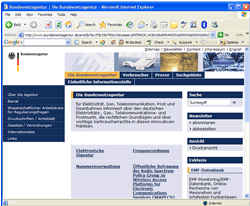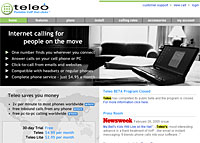 The Economist is a publication that we regard highly. It’s not for nothing that they gained a strong reputation. Sadly a recent piece on the Digital Home let them down.
The Economist is a publication that we regard highly. It’s not for nothing that they gained a strong reputation. Sadly a recent piece on the Digital Home let them down.
In the 3-9 September issue of The Economist, the leader on page 14 tells readers that ‘Most people will never turn their homes into electronic control centres‘ (sub) and that ‘convergence’ will fail.
It’s a well written, witty piece that sadly not only demonstrates the writers lack of understanding of the subject, but their disconnection with the current news.
This summary pieces doesn’t do justice to the full article starting on pages 68 which grasps many of the issues far better.
Returning from a week at IFA, I have some sympathy with the idea that the ‘dream’ that the consumer electronics (CE) companies are try to sell to the public are unlikely to be met immediately – especially in Germany where it is a well known economic fact that the population are holding on to their money with ever more zeal, in terror of losing their jobs in the current economic uncertainty.
I sat in successive press conferences, listening to each CE company CEO tell the assembled analysts and hacks that, unlike the technology companies, They Understood the consumer. This lead them to announce a parade of nearly idential product line-ups, which frankly all blurred into one.
 This was repeated with halls and halls of identikit stands. Remove the brand names and it would have been a challenge to tell them apart.
This was repeated with halls and halls of identikit stands. Remove the brand names and it would have been a challenge to tell them apart.
The exception was Sony, whose bold attempt to live their strap-line, ‘Like.no.other’, lead to a stand that didn’t line up endless products, but played with your senses and tickled your emotions. Sadly the majority of journalists _hated_ it – perhaps saying more about the state of journalism in this fields than the stand itself.
The Tech co view
Until now, the main focus of technology companies has been to sell as much equipment and services to the business market. Having reached total saturation, and business becoming unwilling to comply with the endless cycle of upgrades, having acknowledged that the benefit they bring are not matched by the cost and disruption they bring.
Having acknowledged this years back, the tech companies turned their sights on selling more equipment to the home user, to provide the platform for digital entertainment – which brings us to today.
Where The Economist got it wrong #1 – Convergence
The definition of convergence that they use is long outdated. They’ve interpreted it as the do-it-all device, they use the illustration of “a food processor doubling as a pleasure vibrator for women.”
Until recently, there was an argument that the only successfully converged device was the clock radio. Understanding of the problems have moved on and there are now good examples, such as the Sony Ericsson k750i camera phone, which not only works well as a phone, but has made taking photos a breeze. It contains the vital ingredient – no barrier to easy use.
So what is Convergence?
It’s not unreasonable to ask given the number different definitions it’s had.
Perversely, as more marketing departments in more companies have become involved in flogging convergence, the term itself has become divergent.
We think many things are key to real convergence, and these include
One delivery path – the delivery of digital media over an IP connection.
The coming together of what were previously thought of as different businesses – witness News International embracing video gaming including their recent purchase of IGN.
The combining of layers of information with video or audio; adding further depth to the programme that along it could never provide.
 Where The Economist got it wrong #2 – MSMedia Centre PCs are a failure
Where The Economist got it wrong #2 – MSMedia Centre PCs are a failure
One glaring lack of knowledge of current, relevant news is brought out by the Leader, stating that Media Centre PC’s, or ‘converged super-gadgets’ as they refers to them, have been an utter failure (this is lead by the main article which states that they accounted for ‘fewer than 1% of all PC’s sold last year’ ).
While this may be true for last year, it ignores recent figures from Current Analysis, publish on the 29 August, which found that Media Centre PC sales have ‘skyrocketed’ to 43% of all desktop computer retail sales in the US from the previous levels of around 15% in July. A significant percentage in anyone book.
The Leader comments also fundamentally misunderstand Microsoft. Anyone who has spent anytime watching them will know that they will never let the Media Centre become a failure. Microsoft know if they can control the device to store and access digital media, they can dominate the market.
IFA/Economist blunder
Given the derisory view the Economist of digital home, it was more than a little ironic that they were giving away promotional copies at IFA. A clear example of the right hand (marketing) not knowing what the left hand (editorial) was doing.
 From a technical perspective switchover it is not going to be a walk in the park. A phased switchover to digital by geographical area between 2008 and 2012. And we’ll only know how many people might be unable to get digital television once the analogue signal has been turned off and the digital signal boosted.
From a technical perspective switchover it is not going to be a walk in the park. A phased switchover to digital by geographical area between 2008 and 2012. And we’ll only know how many people might be unable to get digital television once the analogue signal has been turned off and the digital signal boosted. Only 25% of US business travellers are using Wi-Fi hotspots in airports and on planes, despite the growing availability of high-speed, wireless connections.
Only 25% of US business travellers are using Wi-Fi hotspots in airports and on planes, despite the growing availability of high-speed, wireless connections. Those surveyed also said that they were more interested in increased onboard personal space, bigger baggage allowances and better entertainment than blasting out emails mid-flight.
Those surveyed also said that they were more interested in increased onboard personal space, bigger baggage allowances and better entertainment than blasting out emails mid-flight. In a damning blow to the UK government’s love affair with identity cards, a British criminologist has warned that the new technology could actually increase, rather than solve, the problem of identity theft and fraud.
In a damning blow to the UK government’s love affair with identity cards, a British criminologist has warned that the new technology could actually increase, rather than solve, the problem of identity theft and fraud. “Studying the way that individuals disclose sensitive information would be far more valuable in preventing identity fraud than the evolution of technologically advanced but ultimately fallible measures to prevent misuse of personal information after it has been obtained,” she added.
“Studying the way that individuals disclose sensitive information would be far more valuable in preventing identity fraud than the evolution of technologically advanced but ultimately fallible measures to prevent misuse of personal information after it has been obtained,” she added. After having made the UK wait nearly 9 months since the launch of the
After having made the UK wait nearly 9 months since the launch of the  Those UK’ers who couldn’t wait for the much-desired, multi-media device to arrive had an avenue closed to them after Sony successfully took legal action against grey-importers of Japanese and US equipment.
Those UK’ers who couldn’t wait for the much-desired, multi-media device to arrive had an avenue closed to them after Sony successfully took legal action against grey-importers of Japanese and US equipment. The boffins at the US National Science Foundation (NSF) have proposed “re-engineering” the Internet to create a whizz-bang updated version that connects all kinds of devices with built in security and robustness.
The boffins at the US National Science Foundation (NSF) have proposed “re-engineering” the Internet to create a whizz-bang updated version that connects all kinds of devices with built in security and robustness. The goals of the GENI Initiative include a new core functionality for the Internet, with new naming, addressing, and identity architectures; enhanced capabilities, including additional security architecture and a design for high availability; and new Internet services and applications.
The goals of the GENI Initiative include a new core functionality for the Internet, with new naming, addressing, and identity architectures; enhanced capabilities, including additional security architecture and a design for high availability; and new Internet services and applications. UK Online have officially joined the 24Mbps broadband party by announcing the October launch of their own broadband ADSL2+ based product.
UK Online have officially joined the 24Mbps broadband party by announcing the October launch of their own broadband ADSL2+ based product. UK Online has been conducting technical trials of its ADSL2+ service since March of this year and their 24Mb broadband service should be available in October for under £30 (~$55 ~€43) a month.
UK Online has been conducting technical trials of its ADSL2+ service since March of this year and their 24Mb broadband service should be available in October for under £30 (~$55 ~€43) a month. Be Unlimited
Be Unlimited Temptingly, there’s no connection fee for new users with a free Wi-Fi-enabled modem lobbed in for no charge (the company will be using DSLAMs from Alcatel, and a Thompson 716g V5 wireless modem, optimised for VoIP and video-streaming applications.)
Temptingly, there’s no connection fee for new users with a free Wi-Fi-enabled modem lobbed in for no charge (the company will be using DSLAMs from Alcatel, and a Thompson 716g V5 wireless modem, optimised for VoIP and video-streaming applications.) Deutsche Telekom have just announced that they will be rolling out 50 Mbit/s connection in 50 cities around Germany by 2007.
Deutsche Telekom have just announced that they will be rolling out 50 Mbit/s connection in 50 cities around Germany by 2007. The “we’ll make the country globally competitive by installing high speed Internet access, but it needs to be made worth our while” argument has been used before by other incumbent telcos when they are trying to get good, or better deals from the regulators.
The “we’ll make the country globally competitive by installing high speed Internet access, but it needs to be made worth our while” argument has been used before by other incumbent telcos when they are trying to get good, or better deals from the regulators. From deep within the Microsoft base, Bill Gates has pulled a few levers and dispatched a corporate grabbing tentacle in the direction of Teleo, a privately held provider of VoIP software and services.
From deep within the Microsoft base, Bill Gates has pulled a few levers and dispatched a corporate grabbing tentacle in the direction of Teleo, a privately held provider of VoIP software and services. The San Francisco-based outfit Teleo was founded just two years ago and got as far offering a beta PC to PC or standard phone Skype-like VoIP service with click-to-call dialing through Microsoft Outlook and Internet Explorer before Gates grabbed the product.
The San Francisco-based outfit Teleo was founded just two years ago and got as far offering a beta PC to PC or standard phone Skype-like VoIP service with click-to-call dialing through Microsoft Outlook and Internet Explorer before Gates grabbed the product. Terms of the deal haven’t been disclosed, but Microsoft have said that members of the Teleo executive team will continue to work closely with MSN, while some Teleo product developers are expected to shuffle across and join MSN.
Terms of the deal haven’t been disclosed, but Microsoft have said that members of the Teleo executive team will continue to work closely with MSN, while some Teleo product developers are expected to shuffle across and join MSN. Elvis Charges Mobile Phones
Elvis Charges Mobile Phones Nearly 40% of Mobiles Bought By US Teens For Texting
Nearly 40% of Mobiles Bought By US Teens For Texting A Feast Of Firefox Facts
A Feast Of Firefox Facts